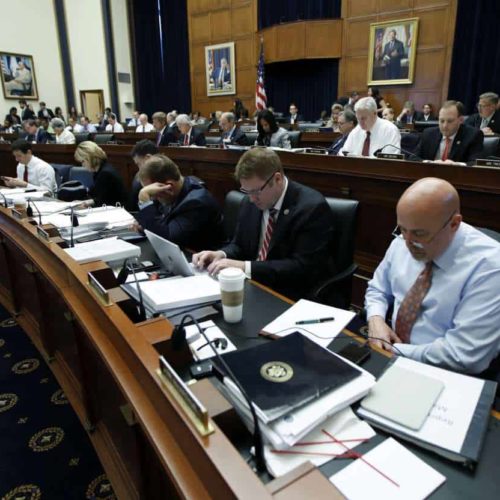Introduction
The financial industry’s hefty investment in the campaigns of House members appeared to pay off this week when that chamber voted to kill a new rule that allows consumers to file class-action lawsuits against banks and other institutions.
The Republican-led House passed a resolution on Tuesday to block a Consumer Financial Protection Bureau (CFPB) rule that was published earlier this month; that rule prohibits financial service companies from inserting agreements in contracts that prevent customers from filing class-action lawsuits against a company.
Those agreements, which have become popular in recent years, instead require consumers to settle complaints through arbitration, a less public and often less costly process favored by financial institutions.
Blocking the rule has been a priority of the financial industry since it was first suggested in the Dodd-Frank Wall Street Reform and Consumer Protection Act passed in response to the 2008 financial meltdown. But killing the rule will also require the Senate to act as the House did.
To fight the CFPB, the financial industry has spent millions cultivating relationships with lawmakers such as Rep. Keith Rothfus, R-Pa., who sponsored the resolution to undo the CFPB arbitration rule.
Since Rothfus was first elected to Congress in 2009, he has received more than $971,000 from financial institutions — $389,990 from securities and investment firms; $316,767 from insurance firms, which sell financial products; and $264,714 from commercial banks, according to the nonpartisan Center for Responsive Politics (CRP). On average, House members receive $163,702 from the financial sector, CRP reported.
Rothfus also enjoys the support of the Club for Growth, the self-described “leading free-enterprise advocacy group in the nation.” The group has given Rothfus $183,428 during his political tenure — more than double the amount from his next highest donor, Federated Investors Inc.
Club for Growth supports a number of financial deregulation initiatives and scores politicians based on their positions on key votes. Rothfus scored an 81 percent last year, ranking him 84th out of the 435 House members.
Six of the resolution’s 33 other co-sponsors are part of what the Center for Public Integrity labeled the “banking caucus,” a group of influential representatives with strong ties to the financial industry. The group includes House Financial Services Chairman Jeb Hensarling, R-Texas; Rep. Blaine Luetkemeyer, R-Mo., and Rep. Ed Royce, R-Calif.
Hensarling’s leadership role has translated into hefty campaign contributions. He has received $4.22 million from the financial industry over the course of his 14-year career in the House. Leutkemeyer and Royce have received $1.69 million and $3.48 million from the industry, respectively, according to CRP data.
To kill the CFPB rule, the House relied on the rarely-used Congressional Review Act (CRA), which allows Congress to undo recently finalized regulations by a simple majority vote. The CRA had only been used once prior to the Trump administration, in 2001 during the Bush administration. The current Congress has used the act to repeal 14 Obama-era regulations.
The CFPB defended the rule after the House vote.
“Our arbitration rule was the result of more than five years of careful research and open deliberation,” CFPB spokesman David Mayorga said in an emailed statement. “We found that blocking group lawsuits makes it nearly impossible for most consumers to get justice and relief for wrongdoing.”
The CFPB rule “makes sure bad actors that harm thousands or millions of consumers can be held accountable,” said Lauren Saunders, associate director at the National Consumer Law Center.
To see the value of the CFPB’s rule, look no further than the Wells Fargo fraudulent account scandal, consumer advocates and lawyers said. Wells Fargo employees, looking to meet internal sales goals, opened at least 2 million fraudulent accounts without customers’ permission.
When the abuse was disclosed, Wells Fargo initially tried to block class-action lawsuits by pointing to the arbitration clause in the contract customers signed with the bank. Facing pressure from Congress and other lawsuits, Wells Fargo agreed to settle a class-action lawsuit for $142 million.
“We know what happens with a class action: Wells Fargo agrees to give $140 million. We also know what would happen in arbitration: Consumers who only have small claims wouldn’t get anything,” said Jeff Sovern, a law professor at St. John’s University.
Saunders said the effort to kill CFPB’s arbitration rule is part of a larger battle to weaken the agency.
“The attack on this rule is part of the continuing reflexive attacks on the CFPB regardless of the merits,” Saunders said. “The CFPB is being attacked for going ‘rogue’ when the agency was doing exactly what Congress gave it authority to do in 2010.”
But the business community sharply disagrees. The prospect of undoing the CFPB’s rule has gained support from trade groups such as the American Bankers Association, the American Financial Services Association and the U.S. Chamber of Commerce. All three signed a letter to members of Congress, along with eight other trade groups representing financial services companies, expressing their “strong disapproval” of the rule, which they claim is based on incomplete research and would expose financial service providers to additional class action litigation.
The Chamber of Commerce also put out a notice to representatives that it would consider their position on repealing the rule a “Key Vote” to be used in the Chamber’s annual scorecard, an important barometer for politicians hoping to prove their business-friendly bona fides.
The Trump administration said the CFPB rule “would benefit trial lawyers by increasing frivolous class-action lawsuits; harm consumers by denying them the full benefits and efficiencies of arbitration; and hurt financial institutions by increasing litigation expenses and compliance costs.”
The CFPB rule’s fate now stands with the Senate, where Banking Committee Chairman Sen. Mike Crapo, R-Idaho, has filed a similar resolution. Crapo ranks among the financial industry’s favorite senators, having received more than $3 million from the financial industry since he arrived in Congress in 1991, according to CRP data. His top donor is JPMorgan Chase & Co.
The Senate has until late September to act and finding the votes to kill the rule may prove more difficult there than in the House. Republicans may be wary of bringing the resolution to a vote for fear of being viewed as siding with unpopular banks, Senate staffers said.
Every Republican senator on the banking committee but one — Sen. John Kennedy of Louisiana — is listed as a cosponsor of the resolution.
Another cosponsor is Sen. Shelley Moore Capito, R-W.V., who was a member of the House until 2014 and made the Center for Public Integrity’s initial list of “banking caucus” members. Other cosponsors include Sens. Marco Rubio, R-Fla. and Pat Toomey, R-Pa., who have received more than $12 million and $8 million, respectively, from the financial sector during their political careers, according to CRP data.
Read more in Inequality, Opportunity and Poverty
Inequality, Opportunity and Poverty
The investment industry threatens state retirement plans to help workers save
States wrestle with impending retirement crisis as pensions disappear
Finance
Is Congress expanding credit for the poor or enabling high-interest lenders?
Critics say push to assist financial technology firms may have unintended consequences


Join the conversation
Show Comments